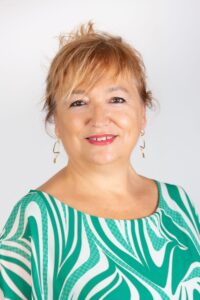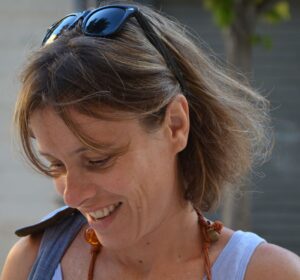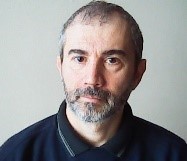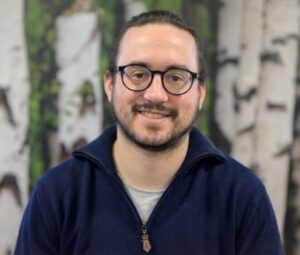Lecturers
 Javier Aizpurua (Donostia International Physics Center, and University of the Basque Country, San Sebastian, Spain)
Javier Aizpurua (Donostia International Physics Center, and University of the Basque Country, San Sebastian, Spain)
Javier Aizpurua is an Ikerbasque Research Professor at Donostia International Physics Center (DIPC) in San Sebastian, where he leads the “Theory of Nanophotonics Group” (http//cfm.ehu.eus/nanophotonics) devoted to the study of the interaction of light and nanostructured materials. Javier Aizpurua achieved his Ph. D. at the University of the Basque Country on the theory of Plasmon excitation by fast electron beams. After research positions at Chalmers University of Technology (Sweden) and NIST (USA), he joined DIPC as a research Fellow. Since 2008, Aizpurua has been leading his group of Nanophotonics at the Center of Materials Physics at CSIC, and since 2024, he has been appointed Ikerbasque Research Professor and Basque Quantum (BasQ) director. Aizpurua collaborates intensely with some of the top groups of nanophotonics all along the world, and has participated in several international scientific projects and networks in the area of nanophotonics. The main impact of his research has been in the field of optical nanoantennas and nanoplasmonics, and more specifically, in the role of quantum effects in the optoelectronic and optomechanical response of nanosystems.
Website: https://cfm.ehu.es/nanophotonics/
Scientific seminar: Extreme nanocavity-enhanced molecular spectroscopy
 Laura Lechuga (Catalan Institute of Nanoscience and Nanotechnology (ICN2), CSIC, Spain)
Laura Lechuga (Catalan Institute of Nanoscience and Nanotechnology (ICN2), CSIC, Spain)
Prof. Laura M. Lechuga is Full Professor of the Spanish National Research Council (CSIC) and Head of the Nanobiosensors and Bioanalytical Applications Group at the Catalan Institute of Nanoscience and Nanotechnology (ICN2) in Barcelona (Spain) and at the Networking Biomedical Research Center (CIBER-BBN). The principal focus of her research is the development of novel nanobiosensor devices based on Nanoplasmonics and Silicon Photonics principles for point-of-care diagnostics. Prof. Lechuga is a world reference in the Photonic Biosensor area, making key contributions and opening new horizons in this field. Her research activities cover from fundamental research to the technological operation of complete sensing platforms, including the technological transfer into products of social applicability. She has published over 300 articles, book chapters and proceedings, has 8 families of patents and four trade secrets, has co-founded two spin-offs companies and has presented her work in more than 490 invited talks. The quality of her research has been recognised by more than 22 prestigious prizes and awards, as the Spanish National Research Award in 2020, the King Jaume I award in New Technologies in 2020, the Ada Byron 2020 Prize, the Physics, Innovation and Technology Prize from the Spanish Royal Physics Society (RSEF) and BBVA Foundation (2016), the Lung Ambition Alliance Prize from ASTRAZENECA, and the National Prize in Nanotechnology, among many others.
Website: https://nanob2a.icn2.cat/
Scientific seminar: Nanophotonics biosensors for Ultrasensitive and Label-free diagnostics at the Point-of-Care.
 Lukas Novotny (ETH Zurich, Switzerland):
Lukas Novotny (ETH Zurich, Switzerland):
Prof. Novotny graduated in electrical engineering, and then obtained his PhD from ETH Zurich, where he nowadays works as a professor of photonics; he is also a distinguished invited professor at ICFO, Barcelona. His expertise and interests cover broader fields of photonics and optoelectronics, spanning from levitodynamics to 2D materials. In his research, he aims to understand and control light-matter interactions on a nanometer scale. The applications of this research range from ultrasensitive detection and metrology to efficient and directional photon emission; he holds eight patents.
Website: http://www.photonics.ethz.ch/
Scientific seminar: Quantum control of levitated particles.
 Maxim Shcherbakov (University of California Irvine)
Maxim Shcherbakov (University of California Irvine)
Prof. Shcherbakov obtained his PhD degree from Lomonosov Moscow State University, and he nowadays teaches at the School of Engineering, University of California, Irvine. His research merges fundamental physics and cutting-edge nanotechnology towards novel photonic devices. His group uses nanotechnology to invent nanomaterials with unprecedented flexibility to manipulate light on demand. His groups’ theoretical and experimental methods propose sophisticated, light-based components with possible applications in imagers, telecommunications and quantum computing.
Website: https://shcherbakov.eng.uci.edu/
Local Lecturers:
 Monica Bollani, IFN-CNR LNESS (Como, Italy)
Monica Bollani, IFN-CNR LNESS (Como, Italy)
Monica Bollani is a researcher at IFN in LNESS laboratory (Como, Italy). She obtained a European PhD in 2000 in Materials Physics (Marseille,France) and until 2004, she moved to a research post-doc position targeting the SiGe epitaxial growth at the ETH in Zurich (CH). Then she became a researcher at CNR in Italy working in the semiconductor growth and, starting form 2009, in optical and electron-beam lithography group in L-NESS, mainly dedicated to nano-fabrication of low-dimensional semiconductor systems. She is responsible of the nano and microfabrication activity on semiconductor materials at LNESS laboratory. She has a broad and multi-disciplinary education integrated by an extended experience in sensors fabrication, in photonics and plasmonic, project management and lab and clean room operations.
Website: http://lness.como.polimi.it/monicabollani.php
Scientific seminar: Optical metasurfaces and meta modulators: from the design to device fabrication and characterization.
 Tiziana Cesca, University of Padova (Padova, Italy)
Tiziana Cesca, University of Padova (Padova, Italy)
Tiziana Cesca is Associate Professor in Experimental Physics of Matter at the University of Padova and she works at the Department of Physics and Astronomy (DFA). Her research activity is mainly experimental and is focused on the investigation of structural and optical properties of nanostructured materials for applications in nanophotonics (in particular plasmonics) and nonlinear optics. Her interests include also the study of structural, electrical and optical properties of impurities introduced in semiconductors and glasses by ion implantation for applications in the field of optoelectronics. She is co-author of 111 publications on international journals with peer review and 1 book chapter. She presented 39 contributions at International Conferences (13 Invited Talks) and 7 seminars at international Institutions. She has been member of the Organizing Committee of 7 International Conferences.
Website: https://materia.dfa.unipd.it/nsg/
Scientific seminar: Tunable nonlinear optical response in hyperbolic metamaterials.
 Marco Liscidini, University of Pavia (Pavia, Italy)
Marco Liscidini, University of Pavia (Pavia, Italy)
Marco Liscidini is currently a professor at the Department of Physics of the University of Pavia, a member of the Steering Committee of the National Quantum Science and Technology Institute and serves as a technical advisor to Xanadu Quantum Technologies Inc., Toronto, Canada. His research activity is focused on the theoretical study and modelling of the light-¬matter interaction in micro- and nanostructures. He works in several areas of photonics, including classical and quantum nonlinear optics, spontaneous emission, plasmon and QW-exciton polaritons, optical sensing and bio-sensing, and photovoltaic effects. His theoretical research activity is in strong collaboration with experimental groups and in the framework of national, European, US, and Canadian research programs. He is a Fellow of Optica.
Website: http://www.liscidini.com/
Scientific seminar: Enhancing the quantum nonlinear light-matter interaction in photonic nanostructures: how to squeeze light out of a resonator.
 Cristian Manzoni, IFN-CNR Milan (Milan, Italy)
Cristian Manzoni, IFN-CNR Milan (Milan, Italy)
Dr. Cristian Manzoni is Research Director at IFN-CNR and contract professor of Physics at Politecnico di Milano. His research focuses on generation and characterization of few-cycle light pulses in the UV, visible and IR range. Applications involve time-resolved spectroscopy and the study of femtochemical reactions. Recently, his interests extended to Fourier-transform hyperspectral imaging and microscopy in the visible and infrared spectral range, and on their coupling to ultrafast science, with applications in remote and environmental sensing, conservation science, security and medical imaging.
Website: https://ifn.cnr.it/people/cristian-manzoni/
Seminar: Multimodal wide-field Hyperspectral microscopy.
Featured Speakers:
 Stefano Corni, University of Padova (Padova, Italy)
Stefano Corni, University of Padova (Padova, Italy)
Stefano Corni is full professor of Physical Chemistry at the Dept. of Chemical Sciences of the University of Padova and associated researcher at CNR Institute of Nanoscience (CNR-NANO) Modena. He got his PhD in Chemistry from the Scuola Normale Superiore, Pisa in 2002, and then joined CNR-NANO Modena first as a post-doc then as a permanent researcher. In 2017 he moved to his current position. He has been visiting researcher at ETH/USI in Lugano and at RMIT in Melbourne. His research interests are focused on developing, implementing and applying multiscale models for molecules and biomolecules interacting with nanostructures, with emphasis on plasmon-enhanced spectroscopy & photochemistry, as well as on protein-nanoparticle interactions for bio and materials science. On these topics, he has been PI or partner PI in various EU projects, such as the ERC Consolidator grant TAME-Plasmons ( https://www.tame-plasmons.eu/ ) , the FET Open project ProID ( https://proidproject.eu/ ) and the EIC Pathfinder project iSenseDNA ( https://www.isensedna.eu/ ).
Website: www.cornilab.eu
Seminar: Modeling the coupling of plasmonic and molecular excitations.

Giuseppe Della Valle (Politecnico di Milano, Milano, Italy)
Giuseppe Della Valle is Associate Professor at the Physics Department of the Politecnico di Milano where he teaches courses of General Physics, Metaphotonics, and Plasmonics. His research is devoted to both theoretical and experimental activities in Physics and Photonics, including the study of micro/nano-structured photonic media, the design and demonstration of photonic chips for quantum simulations, the modeling of hot-carrier dynamics in nanomaterials, the development of active photonic devices and nonlinear and ultrafast metasurfaces.
Home page: https://www.fisi.polimi.it/en/people/della_valle
Seminar: Nonlinear and ultrafast metasurfaces: an overview from the H2020 METAFAST project.

Nicolò Maccaferri (Umeå University, Umeå, Sweden)
Nicolò Maccaferri is tenure track assistant professor in Condensed Matter Physics at the Department of Physics of Umeå University (Sweden). He got his PhD in Physics of Nanostructures and Advanced Materials in 2016 from the University of the Basque Country and CIC nanoGUNE (Spain), and then joined the Italian Institute of Technology as a postdoc in 2017. In 2019 he moved to the University for Luxembourg, where he was the recipient of a CORE Junior Fellowship funded by the Luxembourg National Research Fund. His research interests are focused on the fundamental and applied aspects of light-matter interactions at the nanoscale for opto-electronics and information processing, photochemistry and biotechnology. In 2023, he was appointed Wallenberg Academy Fellow by the Royal Swedish Academy of Sciences and awarded an ERC Starting Grant.
Website: https://www.umu.se/en/research/groups/nicolo-maccaferri-lab/
Seminar: Research Integrity: why it is important and why we need to talk (a lot) about it.